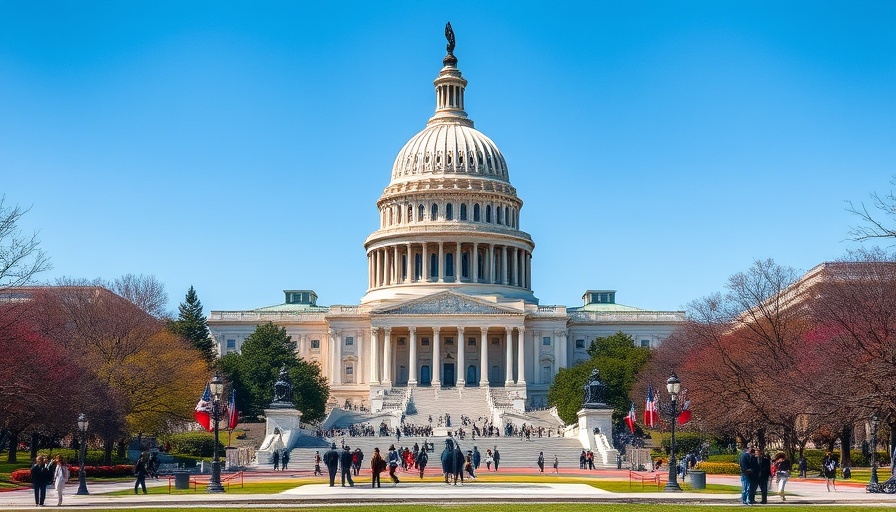
Republican Leaders Rally Behind Trump's Actions Against Iran
The recent announcement by former President Donald Trump regarding military strikes against Iran has sparked immediate praise from leading Republican lawmakers. The decision, which involved U.S. forces bombing three Iranian nuclear facilities, was met with enthusiastic support, not only from Republicans but also from some Democrats who acknowledged the necessity of a strong stance against perceived threats. Senator Lindsey Graham of South Carolina remarked on X, "Well done, President Trump!" indicating a united front within the party.
Political Calculus: Calculating the Risks and Benefits
As elected officials weighed in on the retaliation, many highlighted the boldness of the move. Senator John Cornyn from Texas lauded the strikes as a "brave and correct decision." This sentiment reflects a broader narrative among the GOP, aiming to project strength as tensions escalate in the Middle East. The support appears to resonate with Trump's fundamental policy of an aggressive America First strategy, making it clear that U.S. involvement in international conflicts often gallops back to domestic politics.
The Broader Implications on U.S.-Iran Relations
these military actions represent a shift in America's engagement strategy towards Iran, potentially stirring both diplomatic and military fallout. The Iranian regime, often viewed through a lens of confrontation, may react heightened hostility, making the region increasingly volatile. Furthermore, the bipartisan division within Congress regarding foreign military involvement also indicates that support for Trump’s decision could fracture among Democrats, as some express concern over escalating a situation that has historical roots of conflict.
Public Sentiment and Its Impact on Upcoming Elections
With the midterm elections approaching, this demonstration of force might resonate with certain voter demographics that favor strong military action. The sentiments expressed by leaders like Republican Senator Markwayne Mullin, who declared, "America first, always," suggest that the party seeks to consolidate support around national security themes. However, this lays a complex path for candidates who wish to navigate the delicate balance of supporting the military while also addressing calls for peace.
The Role of Social Media in Shaping Perceptions
The immediacy of social media reactions has amplified leaders' messages, echoing Trump's assertive foreign policy stance to broader audiences. Platforms like X and Twitter are now central to how political narratives unfold in real-time, highlighting the intersection of digital communication and political discourse. In moments of swift military action, social media is proving to be potent for rapid dissemination of support or criticism, shaping public perception almost instantaneously.
Exploring Counterarguments to a Militaristic Approach
Despite the prevailing support from Republican ranks, there are voices of caution emerging, especially among some Democrats. They argue that such military actions could lead to unintended consequences, such as the escalation of conflict or diplomatic relations being further strained. The wisdom of utilizing a military-first response strategy remains a contentious debate worth exploring, questioning whether robust military action ultimately ensures national or global safety.
The Path Ahead: What Lies in the Aftermath
As Trump’s decisions catalyze voices across the political spectrum, it raises significant questions about the future of U.S. foreign policy. Will this assertive stance lead to longer-term strategies in dealing with Iran, or will it instead result in further entrenchment of hostilities? The upcoming weeks will be crucial as Congress and the American public continue to respond, grappling with the tension between security and diplomacy in an increasingly complex global landscape.
Final Thoughts: Keeping Watch on the Political Landscape
The political ramifications of Trump's military action against Iran could reverberate through aspects of both foreign and domestic policy. It presents a window of opportunity for those interested in observing how U.S.-Iranian relations evolve in light of these recent developments. As we keep an eye on trending news today, understanding the public's perception and political reactions will be key for voters approaching the next election cycle, potentially shaping the landscape of American politics for years to come.
In conclusion, as discussions intensify around military involvement in global conflicts, it is crucial for citizens to stay informed. Regular updates on trending news can provide insight into significant geopolitical shifts and their implications on national and global scales. Your engagement in understanding these issues not only informs personal beliefs but also empowers your role in shaping the political discourse.
 Add Row
Add Row  Add
Add 




Write A Comment